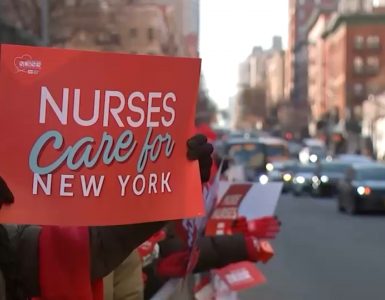Vayishlach 5781
And Eisav ran towards him, embraced him, fell upon his neck, and kissed him, and they wept. (Bereishis 33:4)
The word “Vayishakeihu” (“and he kissed him”) in this Pasuk, has dots on top of all the letters according to Masoretic tradition. This is meant to qualify the literal meaning of the word. Hence, Chaza”l say “Eisav did not kiss Yaakov with all his heart”. R’ Shimon bar Yochai disagrees. He famously avers, “It is a Halacha – a known fact – that Eisav hates Yaakov, however, at that moment his feelings of compassion were aroused and he kissed him with all his heart” (Sifri, Beha’alosecha, 69).
Eisav’s infamous hatred of Yaakov is a “Halacha” – an unchanging reality – according to R’ Shimon bar Yochai. Chaza”l made a number of enactments to avoid triggering hatred, many of which are enumerated in the Gemara in Avoda Zara. In the following paragraphs, we will discuss the issues often faced by medical personnel regarding balancing Shmiras Shabbos and concerns of Eivah (potential for enmity towards Jews).
In several instances[1], Chaza”l waived Issurim due to the potential for Eivah. For example, the Gemara in Avoda Zara (26a) rules that although it is forbidden for a Jewish midwife to deliver the baby of an idol worshipper (as the child will be raised to serve idols), she may nevertheless do so due to the concern of Eivah if she will be paid. (She can safely refuse to do it without pay as the idol worshipper will assume that she doesn’t want to work gratis.) The Ritva (ad. loc.) adds that if the idol worshipper will sense that she is declining because she does not want to deliver a child to an idol worshipper (and not because she doesn’t want to work gratis), it is even permissible to deliver the baby without compensation.
The Gemara also states that this only applies during the week. On Shabbos, a Jewish midwife may not deliver the baby of an idol worshipper – even for pay – as she can mitigate any potential Eivah by claiming that she may not deliver babies on her Sabbath. Though she does deliver Jewish babies on Shabbos, she can claim that that is because those mothers observe Shabbos themselves. This Halacha is codified by the Shulchan Aruch (Y.D. 154).
The Gemara (ibid.) also states:
Rav Yosef thought that although the Braisa states, “One should not rescue idol worshippers…[from a pit into which they have fallen]…”, one should rescue them when they offer to pay for it because of Eivah.
Abaye said to him, [one needn’t rescue them, even if they offer to pay as] one can claim, “My son is standing on a roof” [and is in danger of falling and I must attend to him immediately], I have an appointment with the governor [and if I am late my life will be in danger, thus I am unable to stop to rescue you].
Before examining the Halachic implications of this Gemara, we will make two observations:
- Who are the idol worshippers referred to in the Braisa? The Shulchan Aruch (Y.D. 158:1, based on the Rambam, Hilchos Avodas Kochavim 10:1) explains that they are members of the seven nations of Canaan. The Be’er haGola (C.M. 425:5) holds that they were people who worshipped stars and constellations who were widespread during the times of Chaza”l.
- The simple understanding of the Gemara is that without the potential for Eivah it is forbidden to save an idol worshipper from death. The Rambam (ibid.) writes this explicitly. However, the Meiri (Avoda Zara ibid.) holds that it is always permissible to rescue an idol worshipper. The Gemara’s debate is only whether there is an obligation to do so or not.
A similar Halacha applies to medical treatment of Nochrim which is also forbidden[2] (see Avoda Zara 26b and Rambam and Shulchan Aruch ibid.). If there is a potential for Eivah (in other words, there is no viable explanation that will be readily accepted by the public to mitigate Eivah), it is permissible.
The Beis Yosef (Bedek haBayis, Y.D. 154) elaborates:
The Orchos Chaim (21, Hichos Avoda Zara 4 s.v. Kasav) cites the Rashba (Shu”t 1:120) who rules: “A Jewish doctor may treat a non-Jewish woman in order to help her conceive because of Eivah, just as it is permitted for a midwife [to deliver babies for idol worshippers due to the concern Eivah]. It was attested that the Rambam himself did this.” However, I found that Rabbenu Yona commented [sarcastically] on this episode, “You shall be blessed, for you are increasing the progeny of Amalek”!
The Chasam Sofer (Y.D. 131) explains that the Ramban and Rabbenu Yona disagree as to whether one may offer treatment to a Nochri when non-Jewish doctors are available. According to the Ramban, if other doctors are available who can provide the same treatment or expertise, there is no reason for the Jewish doctor to refrain, as the treatment will be provided regardless. According to Rabbenu Yona, providing them with treatment is always forbidden, no matter the circumstances. This disagreement is extremely pertinent today as there is great diversity among the medical professional staff in hospitals and Jews work alongside their non-Jewish colleagues.
The Darchei Teshuva (ibid. 154) explains that the Ramban would treat Nochrim because he was known to be an expert doctor who would treat any patient who came to him. If he had treated Jews only, there most certainly would have been issues of Eivah, thus it was permissible. This rationale also applies to doctors today.
Is it permissible to violate Issurim due to concerns of Eivah?
The Rishonim clearly state than no Torah prohibitions may be violated due to the concern of Eivah. Regarding Issurim d’Rabbanan, there is a disagreement among the Acharonim. The Pri Megadim (O.C. 330), Eishel Avraham (5), and Mishna Berura (ibid. 8) are unsure about this matter, for the Ritva and Ran (Avoda Zara ibid.) write explicitly that Eivah is not a justification for violating even Issurim d’Rabbanan[3] but other Rishonim imply otherwise[4]. The Divrei Chaim (O.C. 2:25) notes that the other Acharonim were clearly lenient as the Gemara implies that Issurim d’Rabbanan are waived when there is a concern of Eivah.
The Mishna in Maseches Yoma (83a) rules that none of the Halachos of Pikuach Nefesh apply to a Nochri. This Halacha is codified by the Rambam (Hilchos Shabbos 2:20) and Tur and Shulchan Aruch (O.C. 329:2). Therefore, where treatment would necessitate Chilul Shabbos, there doesn’t seem to be a reason to permit it as it isn’t considered Pikuach Nefesh that overrides Torah prohibitions, and Eivah concerns don’t permit the violation of Issurim d’Oraisa. The Mishna Berura therefore expresses great astonishment at the conduct of Jewish doctors who would violate Issurim d’Oraisa on Shabbos to treat Nochrim:
The doctors of our times, even the more virtuous among them, are not careful about this matter at all. There are instances every Shabbos of doctors who travel many Parsaos to treat Nochrim, and they personally write [prescriptions] and crush herbs. They have nobody to rely upon in doing so. For even if it is permissible to violate Issurim d’Rabbanan on Shabbos due to Eivah [though even this is unclear – see the Pri Megadim] everybody agrees that one may not violate Issurim d’Oraisa. They are willful desecrators of Shabbos.
The Yaskil Avdi (Shu”t 6, 297b, 9) also decries the fact that even Torah-observant doctors disregard this Halacha, noting “they are of a generation that does not listen to its teachers”!
However, there are many Acharonim who justify the conduct of doctors who violate Issurim d’Oraisa to treat non-Jews:
- The Divrei Chaim (ibid.) says that he heard that it was permitted in one of the enactments of the “Va’ad Arba Aratzos”, though he hadn’t seen that recorded anywhere.
- The Chasam Sofer (Y.D. 131, see also C.M. 194) explains that it is permissible because we dwell among the Umos haOlam, and if we would refuse to treat them they would say that their blood is insignificant in our eyes. This would place us in grave danger, as they wouldn’t accept any of our pretexts and their doctors could even refuse to treat Jewish patients in return.
- The Darchei Teshuva (Y.D. 154:9) offers another justification:
See the Sefer Shvilei Dovid who notes that today, Jewish midwives are lenient in delivering non-Jewish babies on Shabbos, and even violate Issurim d’Oraisa in doing so. [The justification is that] there is government oversight of this… See the Tiferes Yisrael (Avoda Zara 2:6) who also attests to the fact that the monarchy issues heavy punishments to midwives who don’t respond to cases they are called to… Therefore it is possible that one may be lenient on Shabbos too.[5]
Do these concerns apply today? Many of the Poskim hold that they do. Rav Moshe Feinstein zt”l was asked how a Jewish doctor should conduct himself in a hospital with both Jewish and non-Jewish patients (Igros Moshe, O.C. 4:79) and noted that it is obvious that none of the pretexts of the sort described by the Gemara in Avoda Zara would be relevant today. Neither the patients nor their family members would accept any excuse for refraining from violating Issurim d’Oraisa in treating patients, and government authorities would consider a doctor who does so to be negligent – or even liable for manslaughter! Rav Moshe therefore recommends that medical professionals try to ensure that their days off coincide with Shabbos[6]. However, if a doctor or nurse must work on Shabbos, they may violate Issurei d’Oraisa to provide treatment:
If it so happens that he needs to work in the hospital on Shabbos, or if he is a qualified doctor whose clinic is closed on Shabbos, and a dangerously ill non-Jew presents himself, he has no choice but to attend to him, even if that means desecrating Shabbos and violating Issurim d’Oraisa. And certainly if an accident takes place near his house and there is a call for the nearest doctor to respond to the scene [he must attend]. The pretexts suggested by Abaye would not be accepted in the countries where we live, and [if he wasn’t to respond] he would be in danger of harm from the relatives of the sick person.
Even if he isn’t concerned about any personal danger, he should be concerned for the great hatred that would be forthcoming from the citizens of the country and the authorities which could be a source of Sakana at a later date. Though Tosfos (ibid. s.v. Savar) hold that Eivah is no justification for violating Issurim d’Oraisa, the situation in these countries today is that the Eivah that would result would pose a grave danger. Even those countries which allow the Jewish people to live according to the laws of the Torah would not tolerate it if that was a reason not to save [their] lives.
In fact, it is extraordinary that the Chafetz Chaim (Mishna Berura 330:8) forbade it, for in Russia, where there was only one doctor in the town for all of the surrounding area, if he wouldn’t attend to non-Jewish patients, they would kill him, claiming that he was the cause of the death of their son or daughter etc. The courts would also not have punished them severely (or at all) for doing so… Since there is even a slight possibility of this occurring – surely in matters of Pikuach Nefesh we are lenient even for the slightest possibility.
This was also the conclusion of Rav Shlomo Zalman Auerbach zt”l (cited in Shemiras Shabbos Kehilchasa 28:54) and Rav Ovadia Yosef zt”l who writes (Yabia Omer 8, O.C. 38):
Today there is greater concern than mere Eivah, for if Jewish doctors would refrain from treating non-Jewish patients on Shabbos and would leave them to die of their illness, it would be a Sakana for other Jewish people, for when the matter would become known, non-Jewish doctors would also refrain from treating Jewish patients. The hatred and resentment of the Jewish people would lead even to Sakanas Nefashos. And certainly the pretext mentioned in the Gemara “For we who observe Shabbos it is permissible to desecrate Shabbos” would not be accepted today at all.
Therefore, the intent of a physician who must desecrate Shabbos and violate Melachos d’Oraisa should be that he is doing so for the Pikuach Nefesh of Jewish patients in general… Today, the technology allows news to travel from one end of the world to another in an instant. This would also appear to be the reasoning of the Rabbanim of the “Arba Aratzos” who permitted Jewish doctors to treat non-Jewish patients on Shabbos, even by violating Melachos d’Oraisa, as attested to by the Divrei Chaim. They also saw this as a matter of Pikuach Nefesh for Jewish patients.
HaGaon Rav Asher Weiss Shlit”a adds:
If this was true in their generations, how much more so is it true in this generation when any commotion immediately travels from one end of the world to another? If it would become known that a Jewish doctor left a non-Jewish patient to die because he did not want to desecrate Shabbos, though he would desecrate Shabbos to save a Jewish person, there would be a clear concern that somewhere in the world Jewish people would be harassed or attacked and their lives will be endangered. In many places I have proven that even a somewhat far-fetched danger is still a matter of Pikuach Nefesh.
- The Acharonim offer another reason to permit doctors to treat non-Jewish patients on Shabbos: The doctors’ intention in doing so is not to provide the treatment per se but to prevent Sakanas Nefashos and Eivah. Therefore, it is considered a “Melacha She’eina Tzricha l’Gufa” – a Melacha that is not performed for the reasons that it was performed in the preparation of the Mishkan and which is only an Issur d’Rabbanan. This is based on the ruling of the Mahari”k (137) that a Melacha that is performed due to fear of death is considered a Melacha She’eina Tzricha l’Gufa. Other Poskim dispute the Mahari”k’s contention (see the Igros Moshe, O.C. 121)[7].
In conclusion, the Poskim are unanimous that medical personnel should attempt to arrange that they do not work on Shabbos so as to avoid the issue of treating Nochrim. If this isn’t possible (which is often the case with doctors in training), they should try to avoid Issurim d’Oraisa, even when treating Nochrim who are dangerously ill. This can be achieved by means of a Shinui, or through performing tasks that can easily be performed by one person together with somebody else. If that is also impossible, they may perform even Issurei d’Oraisa because of the potential for Eivah.
[1] See Avoda Zara 6b where the Gemara discusses at length whether one may accept gifts from idol worshippers on their festivals. See also the Tur and Shulchan Aruch, Y.D. 148.
[2] The Acharonim note that the Rambam implies that this Halacha applies to all Nochrim, not just idol worshippers. See the Chasam Sofer Y.D. 131.
[3] The Ritva (Avoda Zara 6b) explains that there are examples of Issurim d’Rabbanan which are waived due to Eivah but that is because Chaza”l did not enact their prohibitions in situations of Eivah.
[4] See Tosfos to Avoda Zara 26a s.v. Savar and the Rashba and Talmidei Rabbenu Yona ibid. See also the Chasam Sofer (C.M. 194) who discusses the Rambam’s view.
[5] The Shvilei Dovid ultimately relies upon the reason of the Chasam Sofer to permit it.
[6] He also discusses the possibility of switching shifts with Jewish, non-observant doctors and whether there is anything to gain in doing so.
[7] See also Tzitz Eliezer 8:15:6 and Yabia Omer (8, O.C. 38) who discuss this matter at length.













Add comment